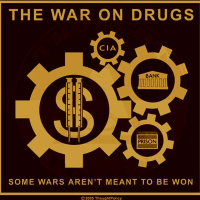Is the Drug War in Latin America Just an Excuse to Provide Contracts for U.S. Companies?
 (graphic: ThoughtPolicy)
(graphic: ThoughtPolicy)
Just as the drug war in the U.S. has been linked to the profitability of the private prison and weapons industries, a Government Accountability Office (GAO) report released last week provides support for the proposition that the drug war in Latin America is little more than an excuse to provide lucrative contracts to U.S. companies in the weapons and military supply industries. According to the report, between 2008 and 2011 the government spent $97 million on the Central American Regional Security Initiative (CARSI), the official name for the U.S. drug war being waged in Central America.
This year’s budget for CARSI is $26.2 million, with another $47.5 million going to Cairbbean Basin Security Initiative (CBSI).
Most of the drug war money is spent on equipment made by U.S. companies, including aircraft, patrol boats, night-vision goggles, body armor, radios, weapons, and X-ray equipment for scanning cargo containers. CARSI also funds counter-drug units comprised of FBI and DEA agents working with local police. More exotic projects have included development of “fingerprint and biometric capabilities” in Central America, implementation of a gun-tracing system called eTrace, and building wiretapping facilities for use against Central America’s citizens.
What have the American people gotten for their $97 million expenditure on the Central American drug war, the purpose of which is to stem the flow of drugs into the U.S.? Judging by the current state of drug use in the U.S., nothing.
About 60 percent of the cocaine that enters the U.S. does so via Central America, traveling two main coastal routes on the Caribbean and Pacific sides of the region. As Rear Adm. Charles D. Michel, commander of U.S. anti-drug task forces in Central America recently told InfoSurHoy, U.S. efforts have succeeded only in forcing traffickers to switch routes, and “We have not achieved [interdiction] on both sides of the isthmus.”
Perhaps more damning is the fact that the flow of drugs has not slowed, the rate at which Americans use drugs has not declined, and the price of drugs has not fallen. If interdiction efforts like CARSI were having an appreciable effect, economics tells us that it would be apparent in the rising price of narcotics: restricting supply should raise price, but that has not happened. In fact, most illegal drugs, including heroin, cocaine and marijuana, have fallen in price over the long term, indicating that supply is keeping up with demand.
-Matt Bewig
To Learn More:
Here’s What Your $97 Million Drug War in Central America Actually Bought (by Robert Beckhusen, Wired)
America’s Drug Was in Latin America Expanding (by Martha Mendoza, Associated Press)
Status of Funding for the Central America Regional Security Initiative (by Charles Michael Johnson, Jr., GAO) (pdf)
State Dept. Outsourcing $10 Billion Air War against Drugs (by Noel Brinkerhoff, AllGov)
We Spend $20 Billion a Year to Fight Illegal Drugs, Yet Cocaine Is Cheaper than It Was 30 Years Ago (by Noel Brinkerhoff, AllGov)
The Trillion-Dollar Drug War: Was It Really Worth It? (by Noel Brinkerhoff, AllGov)
- Top Stories
- Unusual News
- Where is the Money Going?
- Controversies
- U.S. and the World
- Appointments and Resignations
- Latest News
- Trump Renames National Football League National Trump League
- Trump to Stop Deportations If…
- Trump Denounces World Series
- What If China Invaded the United States?
- Donald Trump Has a Mental Health Problem and It Has a Name






Comments